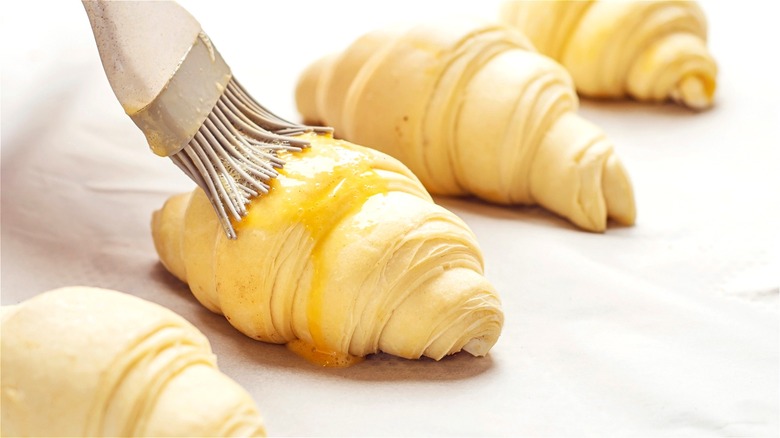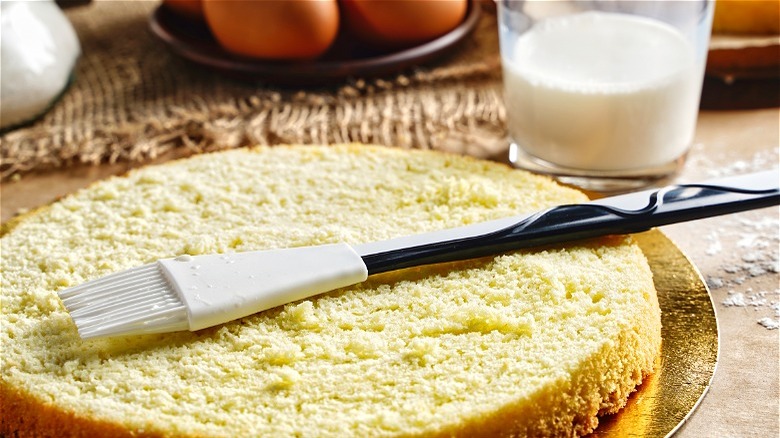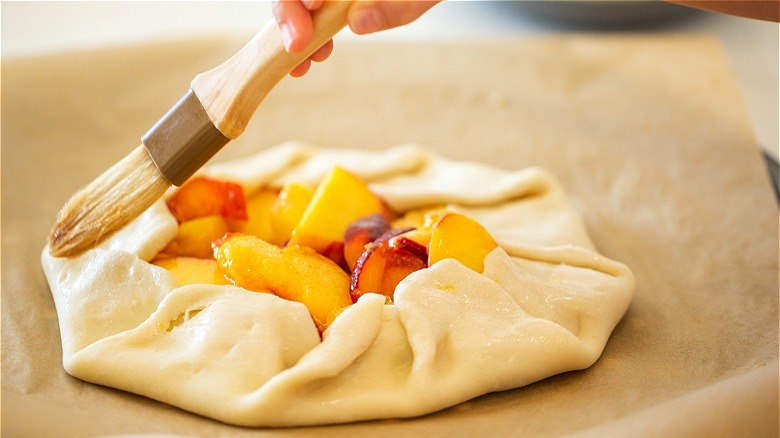How To Get The Look Of An Egg Wash Without The Price
Picture this: It's a lovely Sunday morning, and you just finished preparing a batch of homemade almond scones, using the rest of your beloved heavy cream and two of the three eggs you have left in your refrigerator for that luscious dough. Unfortunately, you didn't save any of the whipped eggs for the necessary egg wash to apply those extra almonds and sugar. Should you really use the last egg you have to apply a simple topping?
Applying egg wash to baked goods is one of those steps you may feel like skipping from time to time if you want to save those precious eggs. What do a few brushes of beaten egg with water really add to your favorite biscuit or scone recipe, anyway? Well, beyond being used as a binding agent for homemade Pop-Tarts with brown sugar glaze, for example, standard egg wash gives all your tried and true baked goods a shiny, golden color.
Egg yolks not only have a deep yellow color that helps deepen the hue of your favorite biscuits, but the fat from eggs is also responsible for the irresistible sheen when baked delicacies emerge from the hot oven. However, using eggs, which have become quite pricey over the last few years, may seem unnecessary in the grand scheme of things. How can you impart the same vibrant luster to your favorite baked treats without wasting another egg? It turns out, all you need is a bit of milk.
The best substitute for eggs in standard egg wash
Because there are so many reasons to eat eggs every day, you may be looking to save those valuable commodities as a solid protein source for the first meal of the day, as opposed to using them to add a shiny glimmer to your next batch of scones. In traditional egg wash, whole eggs are mixed with a small amount of water and sometimes milk or cream. If you still want a glossy sheen plus a hint of additional flavor, save your eggs and opt for milk alone.
David Joachim, author of "The Food Substitutions Bible," believes milk or heavy cream is the best substitute for egg in standard egg wash (via PureWow). But why? Milk wash contributes to the development of that signature golden brown sheen on your baked goods, and the lactose in milk also adds flavor to your favorite treats.
Because milk is thinner than scrambled raw eggs, it's best to use the dairy product on recipes that expand when baked, such as pull-apart rolls, so the liquid isn't just absorbed back into the dough. For a thicker egg wash alternative for fruit tarts and pies, cream is recommended.
Other workable egg wash substitutes
While there are many ways you can combine the various parts of an egg with liquid — not to mention the option of using milk or cream by itself — milk and eggs aren't your only options when it comes to crafting an affordable egg wash.
The two most affordable alternatives to keep in your back pocket are oil and water. Olive oil not only imparts a nuanced flavor but also browns your baked goods evenly. The only downside to using oil is when you need to add an additional ingredient or two to the top of your favorite treats — oil doesn't have the same binding qualities as eggs or dairy. Water, meanwhile, is the cheapest option; it does an excellent job of keeping your baked goods stable with a soft exterior. However, H2O doesn't add anything extra in terms of color and flavor.
Besides water and oil, dairy-free milk alternatives such as rice and almond are great substitutes, as are yogurt and maple syrup. Just keep in mind that baked goods coated with a natural sweetener and cooked at high temperatures run the risk of burning more easily. Some bakers even argue that hard-boiled eggs are the key to better-baked goods.
Your bread-like delicacies will always be up to par with a traditional egg wash. However, there's nothing wrong with trying a more affordable alternative.


